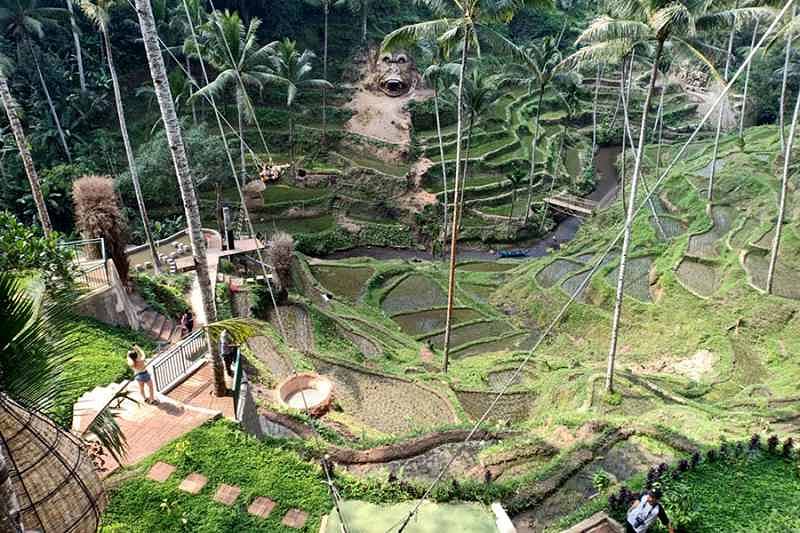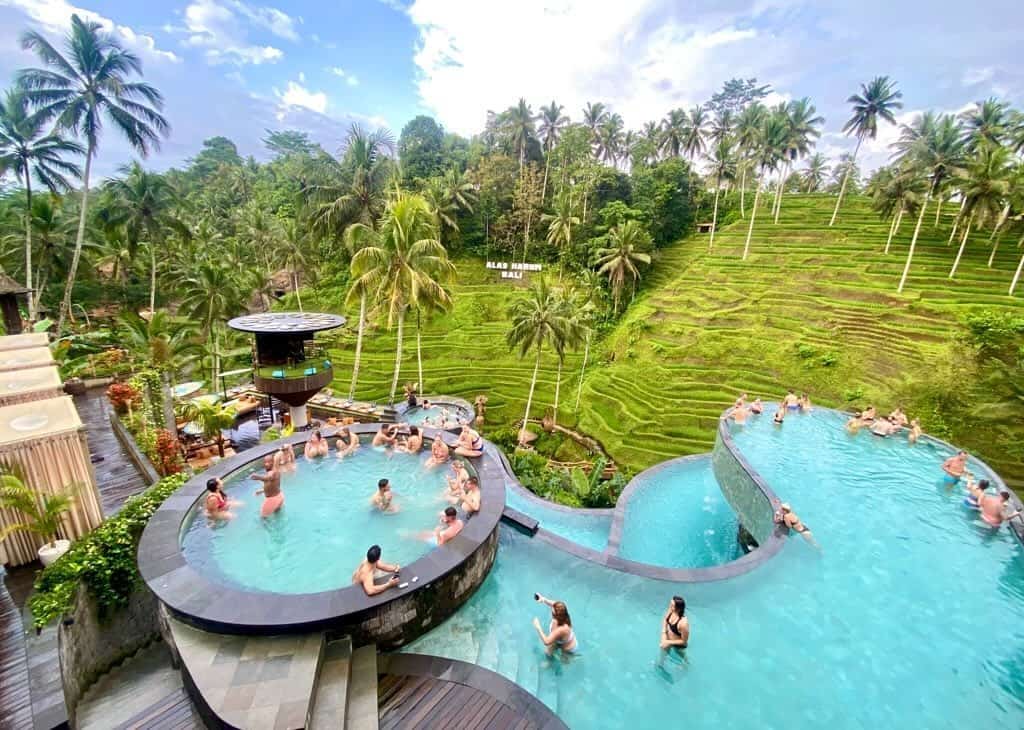Extraordinary Experiences Await: Study Agrotourism in Ubud
Extraordinary Experiences Await: Study Agrotourism in Ubud
Blog Article
Exploring the Rich Culture and Impressive Landscapes of Agrotourism in Ubud
Ubud, commonly celebrated as the heart of Bali, offers an unique opportunity for those looking for to experience agrotourism that perfectly blends cultural richness with breathtaking landscapes. This interesting destination provides an array of tasks, from engaging with the complex craftsmanship of local artisans to checking out the verdant rice balconies that define the region's agricultural heritage. As tourists browse through Ubud's lively tapestry of traditions, they are welcomed to discover the stories behind each social practice and landscape function. What exists under the surface of this exciting experience is an elaborate internet of heritage and nature awaiting exploration.
Uncovering Ubud's Cultural Heritage
Nestled in the heart of Bali, Ubud functions as a dynamic epicenter for those excited to look into the island's abundant cultural heritage. Recognized for its artistic practices, Ubud is a hub where old techniques meet modern expressions, creating an unique tapestry of social experiences. Visitors are drawn to its myriad of galleries, workshops, and temples, each offering a glance right into Bali's historical and creative tradition.
Central to Ubud's social appeal is the Ubud Palace, a substantial landmark that stands as a testament to the area's royal heritage. The royal residence frequently holds conventional dancing efficiencies, providing a genuine insight right into Balinese narration with dancing and songs. Moreover, the roads of Ubud are lined with galleries showcasing jobs of both popular Balinese musicians and arising skills, mirroring the island's vibrant art scene.

Immersive Agricultural Knowledge

Additionally, Ubud's agrotourism campaigns often consist of workshops on lasting farming methods. These workshops stress the relevance of natural farming, permaculture, and biodiversity preservation, usually under the assistance of experienced experts. They act as an educational platform for tourists, cultivating a much deeper admiration for the details of sustainable agriculture.
Furthermore, visitors can discover coffee and chocolate vineyards, where they find out about the processes of growing and production. Assisted excursions provide detailed descriptions of each step, from bean to mug or chocolate capsule to delicious chocolate bar, improving the overall understanding of these significant farming products.
These immersive experiences not just enrich site visitors' understanding of Ubud's agricultural heritage yet also click to read advertise sustainable tourist methods, ensuring the preservation of these social landscapes for future generations.
Breathtaking Rice Terraces and Landscapes
Building on the immersive farming experiences, site visitors are attracted to the captivating scenic rice terraces and landscapes that define Ubud's countryside. The subak watering system, a UNESCO-recognized social heritage, showcases a lasting and ancient approach of water administration that proceeds to sustain local agriculture.
As visitors traverse the winding paths through the balconies, they are met scenic views that stretch across verdant fields, stressed by guiding coconut hands and the distant silhouette of Mount Agung. The landscape gives a calm background that welcomes reflection and appreciation of nature's beauty (Agrotourism in Ubud). For those interested in digital photography, the ever-changing light and darkness cast by the daybreak or sundown provide numerous chances for catching sensational photos
Past the balconies, Ubud's moving hillsides and lush plants develop a diverse tapestry that bids expedition. Hiking trails meander via these landscapes, allowing visitors to get in touch with the land and experience the relaxing rhythm of rural life.
Farm-to-Table Culinary Delights
Amidst the all-natural elegance of Ubud's landscapes, the farm-to-table movement supplies an authentic cooking experience that connects visitors with the area's agricultural heritage. This approach commemorates the symbiotic partnership between the land and its produce, with neighborhood farms giving fresh, natural ingredients to Ubud's innovative cooks. Visitors are official site invited to take part in a gastronomic journey where the beginnings of each component are transparently showcased.
In Ubud, farm-to-table eating transcends plain usage; it comes to be an academic experience. Restaurants usually use guided excursions of the ranches supplying their kitchens, allowing restaurants to witness lasting farming practices firsthand. This link promotes a deeper recognition for the thorough treatment that enters into cultivating the crops and raising livestock.
The culinary offerings reflect the rich variety of Ubud's agricultural landscape, including recipes that highlight seasonal fruit and vegetables and traditional Balinese tastes. From vibrant salads overflowing with unique eco-friendlies to aromatic curries instilled with fresh natural herbs, each plate is a testament to the region's abundant harvests.
In addition, the farm-to-table ethos supports neighborhood farmers and communities, guaranteeing that agricultural traditions are preserved while promoting economic sustainability. This activity highlights a commitment to high quality, sustainability, and the event of Ubud's one-of-a-kind terroir.
Engaging With Regional Artisans
Several visitors find themselves mesmerized by the elaborate workmanship pop over here of Ubud's regional artisans, whose work reflects the area's rich cultural heritage. These craftsmens, frequently masters of their craft, add substantially to Ubud's lively social landscape. From conventional batik textiles to meticulously sculpted wooden artifacts, each piece narrates linked with generations of knowledge and practice.
Engaging with these artisans offers an one-of-a-kind possibility to dig much deeper into Balinese society. Several workshops offer hands-on experiences, where visitors can find out methods passed down with centuries. These interactive sessions not only foster admiration for the artisans' abilities but likewise provide a meaningful connection to the region's history and practices.
Site visitors can explore craftsmen villages such as Mas, renowned for its great wood carvings, or Celuk, well-known for splendid silver fashion jewelry. Below, one can witness the dedication and accuracy needed to create each work of art. Purchasing directly from these artisans guarantees that the profits sustain local neighborhoods and sustain conventional techniques.
In Ubud, involving with neighborhood artisans is not just a visitor task; it is an enriching social exchange that boosts the agrotourism experience, leaving site visitors with a much deeper understanding and admiration of Bali's imaginative heritage. - Agrotourism in Ubud
Verdict
The exploration of Ubud's agrotourism uses a profound appreciation for Balinese cultural heritage and natural grandeur. Jointly, these aspects foster a much deeper understanding and recognition of Ubud's withstanding cultural and all-natural allure.
Central to Ubud's cultural attraction is the Ubud Palace, a significant site that stands as a testament to the area's imperial heritage.Ubud offers a myriad of immersive agricultural experiences that permit site visitors to engage deeply with the island's agricultural lifestyle.Structure on the immersive agricultural experiences, visitors are attracted to the fascinating scenic rice terraces and landscapes that define Ubud's countryside.In the middle of the natural elegance of Ubud's landscapes, the farm-to-table motion offers a genuine cooking experience that links visitors with the area's agricultural heritage.Several site visitors find themselves captivated by the complex craftsmanship of Ubud's local artisans, whose work reflects the area's abundant social heritage.
Report this page